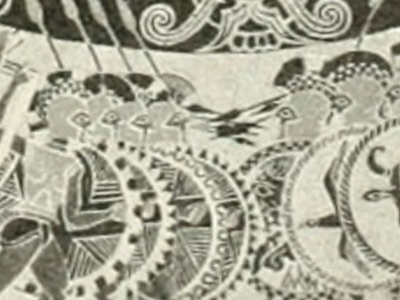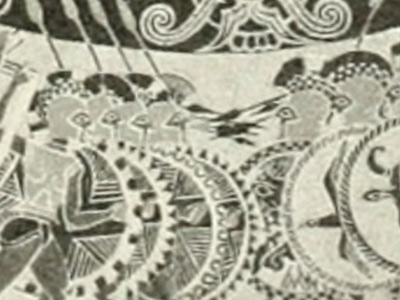First Messenian War (743—724 BC)

Background
Early rejection of the Heraclid king
The Peloponnese had been Achaean before the return of the Heracleidae in 1104. The three victorious Dorian commanders, who were Heraclids, divided the Peloponnese between them. Temenus took Argos, Aristodemus took Sparta and Cresphontes took Messenia. The previous ruling family of Messenia, the Neleides, had emigrated with the Atreids, rulers of Mycenae and Argos, to Athens. Most of the Achaeans remained in place.
The Dorians colonized Sparta, then a small state on the east of the central Eurotas valley. Aristodemus was assassinated leaving Sparta to be ruled by his twin sons under a Theban regent, Theras, their mother's brother. When the twins reached majority Theras led a colony to Thera. Meanwhile, the Messenians had accepted Cresphontes as king after he married Merope, daughter of Cypselus, king of Arcadia and an Achaean. They gave up some land to another Dorian enclave in Messenia. Subsequently the noble families of the Achaeans staged an insurrection, assassinating Cresphontes and all but one of his sons in a single coup. The youngest, Aepytus, was being educated in Arcadia.
Acceptance of the Aepytidae
Aepytus on reaching manhood shortly was restored by the kings of Sparta (Dorian), Argos (Dorian) and Arcadia (Achaean). The Messenian aristocracy was won by gifts and kindness, except for the regicides, who were executed. Aepytus founded a dynasty of kings of Messenia, the Aepytidae. The Heraclid part of the family background was explicitly dropped. The Aepytidae integrated totally into Achaean culture. They took the ancient Achaean (and Pelasgian) shrine on the summit of Mt. Ithome as their own, compelling the Dorians to worship there also. Ultimately under King Phintas they joined the yearly festival to Apollo at Delos, the very central festival and most important place of worship of the Ionians, the descendants of the Achaeans.
This Achaeanizing provoked the Dorians living in Messenia. They viewed themselves as dominant over the Achaeans by right of conquest. They were supported in this view by Sparta, which had maintained a successful Dorian enclave, eventually achieving ascendance over the Achaeans in the Eurotas valley, who became the perioeci.
The raid on the temple of Artemis Limnatis
The intense ethnic animosity and contention that prevailed between the Dorians and the Achaeans is illustrated by an incident of violence that occurred 25 years prior to the First Messenian War, during a festival at the temple of Artemis Limnatis around 768 BC. This was the year that king Phintas, considered Dorian by the Dorians, brought Messenia to an Ionian festival. The temple was on the border between Messenia and Laconia and only Messenians and Laconians worshipped there. Artemis, sister of Apollo, had long been a popular goddess among the Mycenaean Greeks.
Pausanias relates two versions of the story. The Spartan version tells of the raping of virgins and the killing of the king of the Agiad line in Sparta, Teleklos. Ordinarily festivals and temples were sacred and were conducted on sacred ground in Greece; even hunted men could take refuge in a temple because of the taboo against violence. The Spartan version does not explain why the Messenians came to worship and suddenly began committing rape and murder on sacred ground.
The Messenian story says that the "virgins" were beardless soldiers dressed up as women under the leadership of Teleklos, and that the soldiers intended to get close to the Messenian aristocracy for an attempt at their lives. The usual religious considerations may not have been considered to apply since the shrine was an Achaean center, not a Dorian one. The soldiers selected for their beardlessness turned out to be too inexperienced, though, and the Messenian leaders easily threw them off and assassinated their commander. Pausanias says: "Those are the stories: believe one or the other according to which side you want to be on."
HISTORY

RESOURCES
This article uses material from the Wikipedia article "First Messenian War (743—724 BC)", which is released under the Creative Commons Attribution-Share-Alike License 3.0.
© Stories Preschool. All Rights Reserved.









